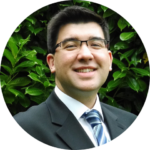Dr Richard Kueh

Dr Richard Kueh tells us about his journey into subject leadership at local, regional and now national level:
Biography
My love of our subject really grew out of experiences and encounters I had growing up. My father is an immigrant from South East Asia who came from a diverse family tradition which included Chinese ancestral veneration and Roman Catholicism (as well as blends of other worldviews, too!). At primary school, my closest childhood friend was Japanese, whose family followed the traditional Shinto faith; another very close friend said he was as an atheist, but later described himself as humanist. I became interested not only in making sense of the perspectives of others, but also in how this shaped the way I lived and how I saw the world.
I owe a deep sense of gratitude to my school Religious Studies teacher. I initially had plans to study Medicine. But this teacher, Mr Graham, inspired me to translate my fascination with beliefs, worldviews and theologies into taking up a place at Cambridge to read Theology & Religious Studies. I was awarded a Starred First at finals and went on to do an MPhil in Biblical studies and a PhD on philosophical hermeneutics.
During my PhD, I had a growing sense of wanting to become a qualified teacher and to make a social difference working in state schools. I loved my training year at the Faculty of Education in Cambridge, especially the interplay between teaching and subject scholarship. I was awarded the Charles Fox Prize for educational research and that experience fuelled my belief that ‘teacher hybridity’– to inhabit both classroom practice and research – is crucial.
My career has included a range pastoral and academic roles in various phases, including Head of Department for a new free school, pastoral Head of Year, SEMH Co-ordinator, RE Subject Specialist for a multi-academy trust, Project Director for a regional school improvement partnership, Vice-Principal of a large secondary school, Associate Principal of a primary school and Director of Teacher Training & Development for a teacher training provider. Most recently, I have been appointed as Her Majesty’s Inspector of Schools and National Subject Lead for Religious Education at Ofsted. Throughout my career, I’ve tried to balance the operational sides of my roles with research and writing about RE.
Reflecting on the journey: triumph and successes, barriers overcome and the vision that inspires you
What inspires me about education is the fruitful collaboration that takes place within it. One of the most important books that I’ve read was the autobiographical reflections of the German philosopher Hans-Georg Gadamer, entitled ‘Philosophical Apprenticeships’. In my own life, I’m indebted to a number of brilliant thinkers to whom – for a while – I became apprenticed: my school RS teacher, Mr Graham, the philosopher Christopher Insole, the biblical scholars Peter Head and James Carleton Paget (my Doktorvater), the RE teacher educator Mary Earl and the history educator Christine Counsell. These people have influenced the way I think about subject, curriculum, education and many other things!
In my RE curriculum work, I’ve similarly sought out dialogue partners. That work has been sharpened through conversations with educators such as Barbara Wintersgill, Ben Arscott, Bob Bowie, Kathryn Wright, Kate Christopher, Mark Chater, Paddy Winter and Rebekah Atkins. I think it’s a success when these exchanges wash up as resources which (crucially) get RE teachers to think and to do (not merely to consume), such as ‘Putting Big Ideas into Practice in Religious Education’ and the 2019 Norfolk Agreed Syllabus.
In the educational world, professionals are beginning to think that subjects are not only important, but central to a theory of change in schools. Occasionally, though, there can be barriers to RE within organisations. Some senior leaders don’t yet fully grasp the importance of RE. I tend not to perceive that as some sort of shortcoming on their part (senior leaders have a lot to juggle), but as an opportunity for the RE leader to explain RE’s extrinsic value (e.g. how and why RE can, indirectly, support other subjects such as History, Science and English), as well as its powerful intrinsic value. This was key in my role as MAT lead for RE when I worked with Headteachers to develop a trust-wide KS2 and KS3 curriculum across 13 schools. Heads of Department in our trust subject community have since described a greater sense of appreciation of RE from senior leaders. These success stories empowered our subject community.
I think that subject communities are so precious and vital within the education profession. I am inspired by the range of voices within the Religion & Worldviews community and am particularly interested in seeing how the next generation of school-based subject leaders become professional ‘hybrids’: leaders who can exist in a range of domains, like subject knowledge, professional practice, policy and educational research. That’s a very exciting prospect, indeed!
Richard takes up his post with Ofsted in April 2020.
@knowledgerich